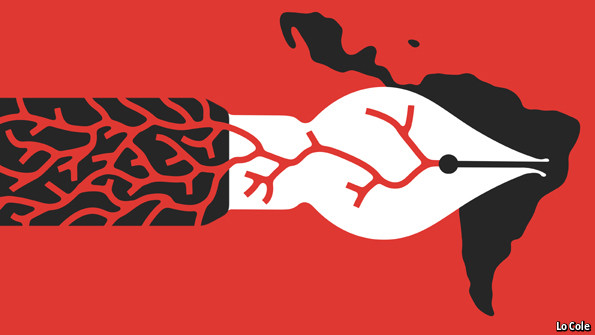The gods that failed

The Economist
LEAVE aside Gabriel García Márquez, and no writer has done more to shape the mental image that both locals and outsiders have of Latin America than Eduardo Galeano. In 1971 the then journalist published “Open Veins of Latin America”, a scorching tirade against foreign exploitation. Now in its 84th impression in Spanish, it remains a fixture on the exiguous shelves devoted to Latin America in bookshops in Europe and the United States. In all, it has sold over a million copies. Hugo Chávez gave it to Barack Obama when they met in 2009.
“Open Veins” is written in powerful prose, with intoxicating passion. But it is also a work of crude propaganda, a mix of selective truths, exaggeration and falsehood, caricature and conspiracy theory. It is the bible of “dependency theory”, the notion dear to the left that “underdevelopment in Latin America is a consequence of development elsewhere, that we Latin Americans are poor because the ground we tread is rich [in resources].”
The message is one of anti-capitalism as well as anti-imperialism. Mr Galeano brackets as “mechanisms of plunder” both “the caravelled conquistadors and the jet-propelled technocrats; Hernán Cortés and the [US] Marines; the agents of the Spanish Crown and the International Monetary Fund missions; the dividends from the slave trade and the profits from General Motors.” He dismisses all possibility of reform; Cuban communism offers the only route to salvation.
So when Mr Galeano let slip, in remarks at a recent book fair in Brasília, that today he would find “Open Veins” unreadable, it was almost as if Jesus’s disciples had admitted that the New Testament was a big misunderstanding. He added that when he wrote the book he lacked “sufficient knowledge of economics and politics” and that it belongs to “a past era”.
Indeed so. Asia’s economic development and Latin America’s commodity-fuelled economic boom of this century expose dependency theory as simplistic nonsense (although it still has adherents in Latin American Studies departments). Social democracy, as practised in Brazil, Chile and Mr Galeano’s own Uruguay, has offered more to the Latin American masses than the Castros’ bankrupt police state.
But the contention of “Open Veins” that Latin Americans are poor because someone—multinationals, local capitalists or the United States—is stealing their wealth retains a profound resonance in the region. It lives on in the rhetoric and actions of governments in Venezuela, Bolivia, Ecuador and Argentina. The political recipe has modulated, however. In place of Cuba’s armed revolution, the formula now is one of “radical democracy”—or “populism”, as its detractors often call it.
This has involved charismatic leaders winning power through elections by claiming to champion “the people” against their oppressors. They then hold on to power by ruthlessly seizing control of all state institutions in the name of the majority and by rewarding their followers with jobs and benefits via an expanded public sector.
The theoretical champion of radical populism, its mobilisation of plebeian masses and its confrontation with the established order was Ernesto Laclau, an Argentine political philosopher who lived in Cricklewood, a placid north London suburb. He argued that populism was an antidote to the capitalist domination of liberal democracy and to the hegemony of technocratic “administration” over the realm of “the political”. Laclau died, aged 78, in April. He remains influential. Ricardo Forster, a friend and sympathiser, was this month named by Argentina’s president, Cristina Fernández de Kirchner, to the new and Orwellian post of “strategic co-ordinator for national thought”.
Yet Laclau’s radical populism contains the seeds of its own downfall, both because it relies on individual leaders (Chávez’s successor, Nicolás Maduro, lacks his mentor’s charisma) and, above all, because it offers no economic answers. Chavista Venezuela, sitting on vast oil reserves, has proved incapable of organising a reliable supply of toilet paper, a product that even theoreticians need. Having run short of hard-currency reserves, Ms Fernández’s Argentina has begun to cut subsidies and make its peace with its foreign creditors, prompting Mr Forster and his friends to warn against a “conservative restoration”.
Mr Galeano’s recantation and the mounting difficulties of radical populism are reminders that capitalism is the only route to development in Latin America. The task for its proponents is to show that it can be a tool not just to create wealth but also to overcome extreme inequality.

No hay comentarios:
Publicar un comentario